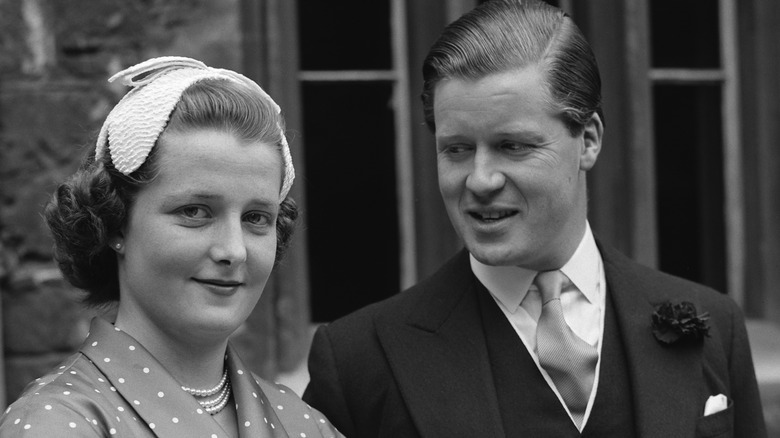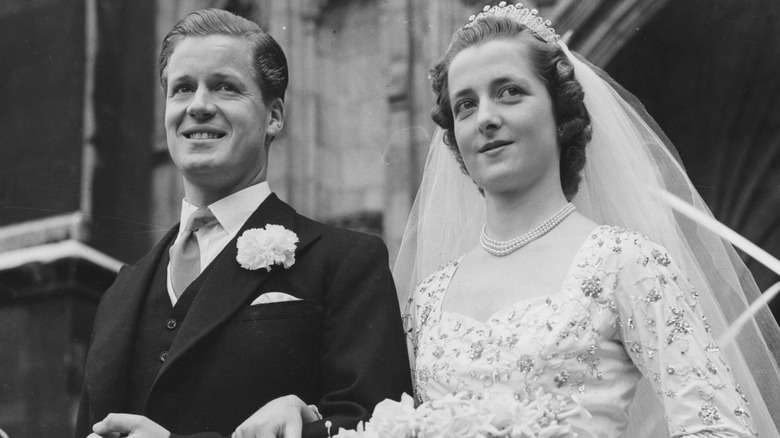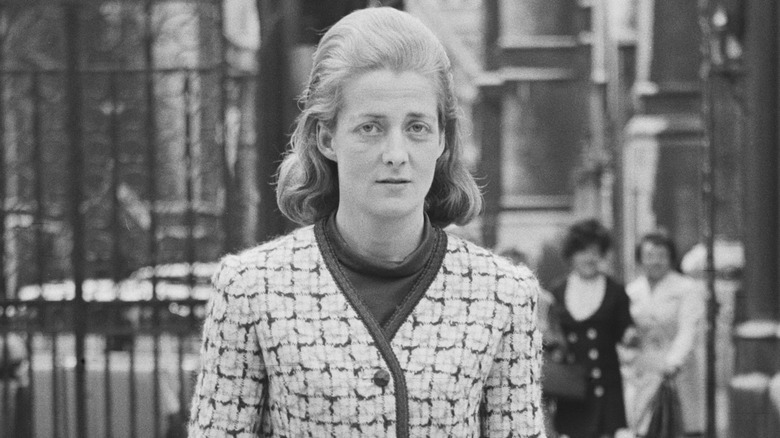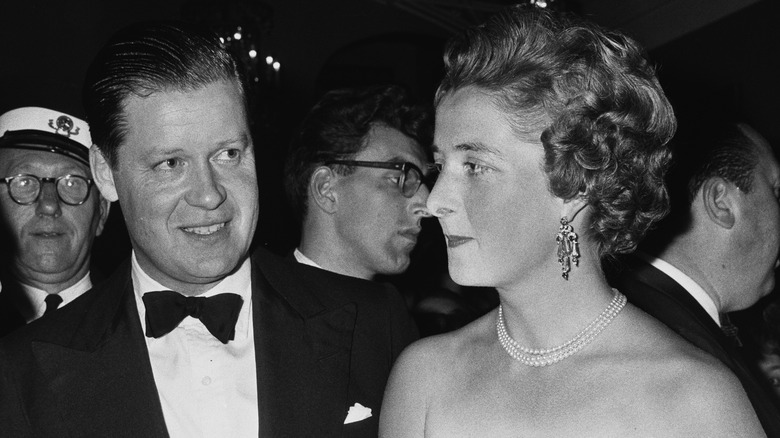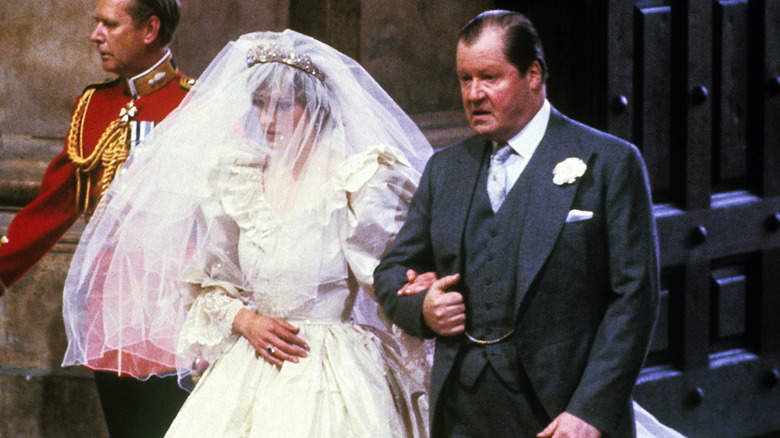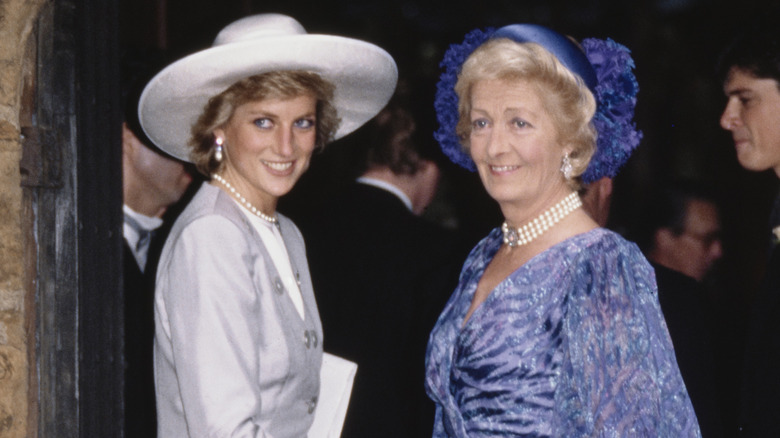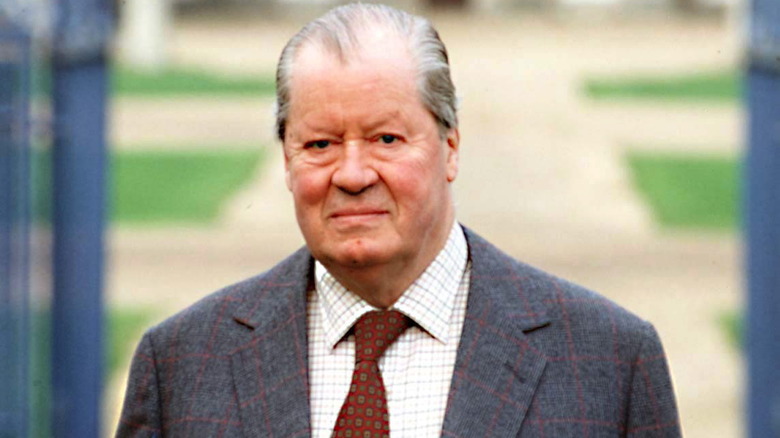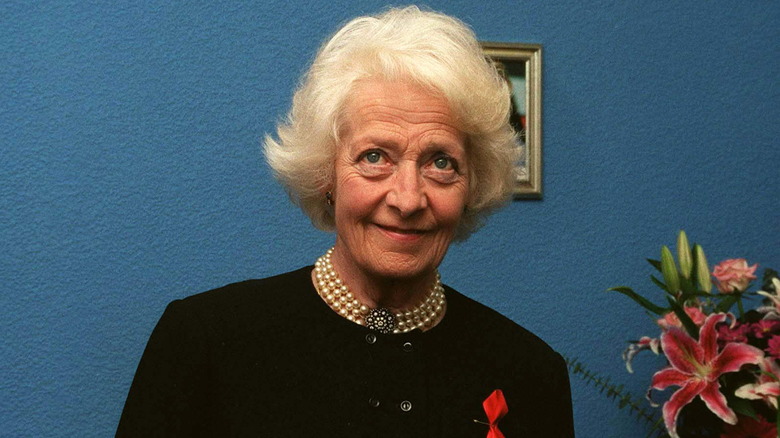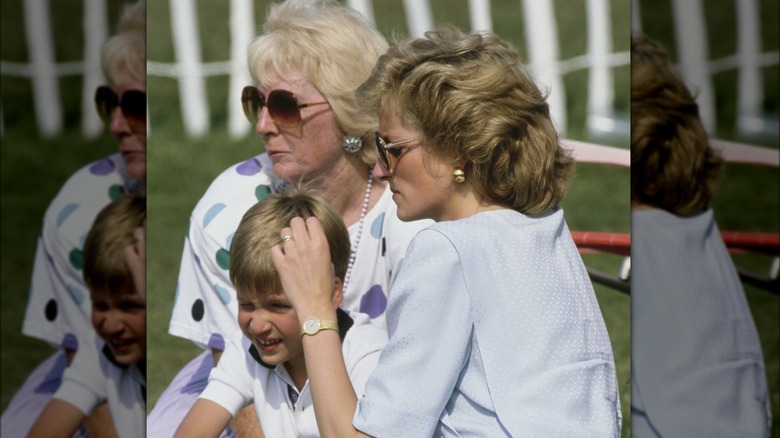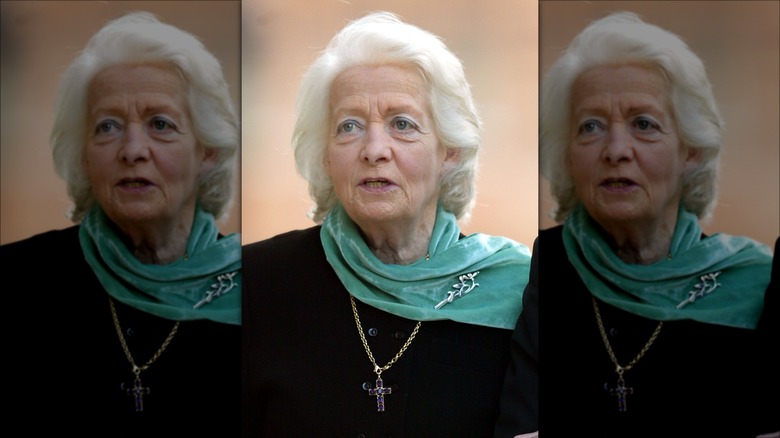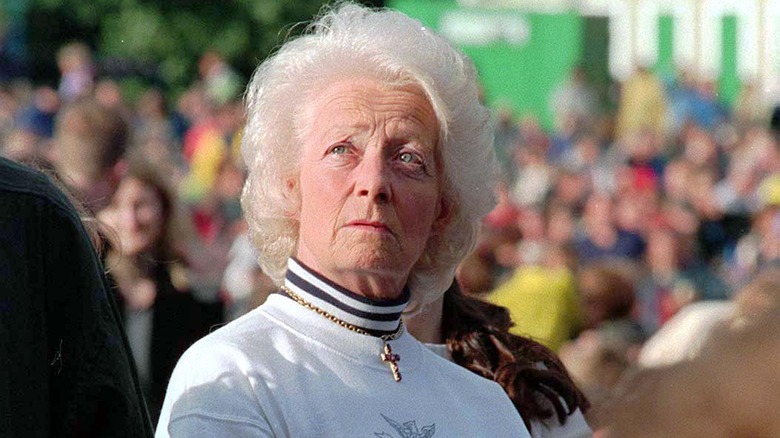Tragic Details About Princess Diana's Parents
The following article contains references to domestic violence and substance misuse.
Decades after the fact, Princess Diana's death remains one of the most shocking royal tragedies of all time. The people's princess, as then-Prime Minister Tony Blair dubbed her upon her fatal 1997 car crash, was beloved both at home and abroad for her infectiously charming persona and tireless altruism (particularly when it came to her fight against the stigmatization of AIDS).
Due to the widespread popularity of Diana, not to mention her unwitting turn as a tabloid staple, her parents, John Spencer and Frances Shand Kydd, generated much intrigue during the princess' all too brief lifetime. To some extent, it's understandable that Diana fans wanted to know more about her family, but this intrusion came at a great cost. Namely, Spencer and Kydd led incredibly tragic lives themselves, many of this misfortune unfolding before that fateful night in Paris in 1997. In the case of Kydd, who outlived her daughter by many years, the tragedy continued after the devastating loss of Diana.
Princess Diana's funeral was heartbreaking, with her mother forced to bury her own child. Kydd was seen weeping as she said goodbye to her daughter, a painful prospect for any parent. Let's explore the cycle of heartbreak that beset the Spencer family. Here are tragic details about Princess Diana's parents.
Princess Diana's parents lost their babies
Princess Diana's parents, Frances Shand Kydd and John Spencer, were desperate for a male heir. The couple had welcomed two daughters, Sarah McCorquodale and Jane Fellowes, in 1955 and 1957 respectively. In 1960, they finally produced a male heir. Sadly, the baby, named John after his father, died just hours after being born due to issues with his lungs. The devastating loss would spell the undoing of the Spencers' marriage.
Tragically, Kydd became pregnant again soon after losing John, but suffered a miscarriage, which she opted to keep a secret from her family. Devastated by her inability to produce a male heir, she sought specialist treatment. "All this time, [she had] a sense of guilt that she was some kind of a failure, which of course she wasn't, because, as we now know, the sex of the child is determined by the male, not the female," wrote royal biographer Andrew Morton, per Express. Eventually, she gave birth to a son, Charles Spencer, in 1964.
In 2022, Diana's surviving brother restored John's grave, which was previously falling apart. Charles took to Instagram to share a photo of the newly restored headstone, paying tribute to the brother he never got to meet. "Looking as it should, now," Charles wrote. "I never knew my older brother, John, and live 100 miles from his grave — but, seeing it last summer, realised serious action was required."
Princess Diana's mother lost custody of her children
John Spencer and Frances Shand Kydd had a tumultuous marriage. Kydd was in love with wallpaper heir Peter Shand Kydd, whom she met in 1966. She blamed the attraction on her lack of connection with her husband. "If Johnnie and I had had a strong marriage, it wouldn't have happened," she said, per The Telegraph.
In 1967, she left the family home to be with her lover, leaving her ex to care for the four children. This decision had a devastating impact on her children, particularly Diana. "While she was packing her stuff to leave, she promised Diana [then aged 5] she'd come back to see her," Charles Spencer told The Times. "Diana used to wait on the doorstep for her, but she never came. She could hear me crying down the corridor ... It was ignorance rather than malice. The thing I've learnt through all the stuff I've tackled is that very few people set out to be destructive."
Frances tried to retain custody of her children. However, in 1968, a court awarded John full custody, a decision that was bolstered by the fact that Frances' mother, Ruth Lady Fermoy, testified against her in court. By her own admission, she never apologized for being an absent mother. "While I believe remorse and regret are vibrantly necessary when we have failed others and failed ourselves," she told Hello! (via The Telegraph), "I do think repetitive apologies are a form of self-pity."
John Spencer was allegedly violent, while Frances Shand Kydd was emotionally distant
The frosty marriage between John Spencer and Frances Shand Kydd was allegedly exacerbated by the former's violent tendencies. "I remember seeing my father slap my mother across the face and I was hiding behind the door and she was crying," Princess Diana said in a recording for Andrew Morton's book, "Diana: In Her Own Words." According to journalist Penny Junor, it was John's abusive behavior that led to Kydd wanting to escape the family home. "She began to plot an escape route for herself. Johnny could be violent, and she felt she and her children would be safer out of the home," Junor said in the CNN documentary "Diana" (via Business Insider). Such sentiments were echoed by aristocrat Julie Montagu, who claimed that Kydd had good reason for leaving her husband.
While there are allegations that Spencer was physically abusive, Kydd was reportedly emotionally distant toward her children. Diana's brother, Charles Spencer, who has also led a tragic life, revealed that Kydd was never really cut out to be a mother. He did, however, state that he doesn't blame his mother for neglecting her children emotionally. "Our father was a quiet and constant source of love, but our mother wasn't cut out for maternity," Charles told The Times. "Not her fault, she couldn't do it. She was in love with someone else — infatuated, really."
Following a stroke, John Spencer had lifelong mobility problems
In 1978, John Spencer suffered a stroke, the effects of which he never recovered from. Princess Diana noticed a marked change in her father following the stroke, and the pair ultimately grew further apart. "He was one person before and he was certainly a different person after," Diana told biographer Andrew Morton (via Vanity Fair). "He's remained estranged but adoring since. If he comes and sees me he comes and sees me, if he doesn't he doesn't. It's not my problem anymore. It's his."
Despite his mobility problems, Spencer was determined to walk his daughter down the aisle in 1981. Although Princess Diana and King Charles' wedding didn't go as planned, Diana did have her father by her side. Walking down the aisle with a limp, Spencer was praised by his son, Charles. "He walked my sister Diana down the aisle of St Paul's in 1981 with stiff, wavering, but determined steps," Charles said, per the Daily Mail.
Princess Diana and her mother had a difficult relationship
There are myriad things we only learned about Princess Diana after her death. One such revelation was the estrangement between Diana and her mother. Diana and Frances Shand Kydd's relationship began to disintegrate following the former's wedding day in 1981. "My mother let me down terribly with the wedding," Diana told Andrew Morton, per People. "She kept crying ... saying that she couldn't cope with the pressure." Accordingly, Diana went no-contact following the wedding, admitting that she didn't speak to her mother for several years afterward. Diana also became enraged when Kydd dished to Hello! in 1997.
At the 2002 trial of Diana's butler, Paul Burrell, Frances Shand Kydd divulged that she and her daughter hadn't spoken in the months leading up to her fatal car crash in 1997. Poignantly, Kydd had written to her daughter several times, but seemingly making it clear that she didn't desire a reconciliation, Diana returned the letters.
Charles Spencer suggested that Kydd's tumultuous relationship with her own mother, coupled with the fact that she married when she was still a teenager, helped elucidate her difficult relationship with her children. "My mother had a very tricky mother herself," Charles told The Guardian. "No doubt these things can get passed down generationally. And she was so young. She went straight from being head girl of a private school to marrying this very eligible chap, and a mother at 19. And she couldn't navigate the demands of that."
John Spencer died of a heart attack in 1992
In 1992, John Spencer was hospitalized following a bout of pneumonia. Princess Diana, who planned to go on a skiing vacation with her family at the time, visited her dad in hospital to ensure he was well enough for her to commence with her plans. While away, she called the hospital every day. Staff told her John was in good spirits and watching the cricket World Cup.
Likewise, Charles Spencer was told his father's condition was stable. "Thinking my father would soon be released — we had chatted on the telephone the night before, and he thought he would be out 'in a day or two' — I was sitting in Althorp's dower house when the telephone rang," Charles said (via the Daily Mail).
Charles received a call informing him his father had taken a turn for the worse. John died from a heart attack and complications of a hemorrhage. He was 68. "I arrived to find my father had died suddenly and, very sadly, alone, taken away by a devastating brain hemorrhage," Charles said. Diana was distraught at the loss; despite wanting to fly straight home, she had to wait until the next morning due to an unavailability of planes. "Diana remained behind the closed shutters with Charles for hours, although how much comfort he was able to give her at this point in their marriage is questionable," Angela Levin wrote in "Harry: Conversations with the Prince."
Frances Shand Kydd allegedly suffered from substance misuse
Princess Diana alleged that Frances Shand Kydd suffered from substance misuse, which she believed was partly to blame for her absence in her life. "She told me she did not like her mother and thought she was an alcoholic," said Dr. Lily Hua Yu, Diana's acupuncturist, per the Daily Mail. "She felt she had no one to guide her when dealing with complicated situations, and if she'd had a good mother she would have had a successful marriage."
In 1996, one year before Diana died in a car crash, Kydd was banned from driving after being caught behind the wheel with a blood alcohol level two-and-a-half times above the legal limit. She was extremely distraught at the arrest and initially denied the charges. "On normal occasions that I deal with her, she is a lady, very dignified," Strathclyde Police Detective Sergeant Dugald MacCallum told the court, per Herald Scotland. "On that occasion, she was not her usual self. She was tearful and she didn't know why she was there.”
According to Charles Spencer, Kydd spiraled into substance misuse as she struggled to cope with life and loss, but tried to seek salvation through religion and philanthropic work. "Her life ended with intense Catholicism; she spent her time helping children visit Lourdes every year," he told The Guardian. "And at the same time, I think, there was massive guilt, which manifested itself through alcoholism ... the last decade of her life was one of sadness."
Frances Shand Kydd spoke of the pain of losing Princess Diana
Believing that they were treated like second-class citizens, Princess Diana's family spoke out against the royal family following her death. When she was informed that her daughter had died in Paris at just 36, Frances Shand Kydd claimed she had to grieve alone, forbidden from telling anyone about her loss. Speaking to the Express (via the BBC) in 2000, she revealed that she didn't get to travel to Paris to see her daughter's body, with the royals making arrangements without consulting her first. Accordingly, she discussed the agony of having lost two of her children, neither of whom she got to see before they died. "It really seems somewhat ironic to me that having buried two children, for entirely different reasons, I was not able to see or touch or hold them when they were dead," Kydd said. Moreover, she criticized the royals for reportedly not contacting her over funeral plans.
Two years later, she called out the then-Labour government for, again, not consulting her over plans for a tribute to Diana in her former home, Kensington Palace. Subsequently, she claimed those in power treated Diana like an object, as opposed to a human being. "She had divorced, she had lost her title," Kydd told VSD (via The Guardian). "For many people, Diana's death simply became a matter of state, but wasn't she also my daughter?"
In her later years, Frances Shand Kydd reportedly became a recluse
Following her daughter's tragic death, Frances Shand Kydd was relentlessly pursued by the press. Accordingly, her second marriage fell apart, with her husband leaving her for a woman two decades her junior in 1988. "The media descended here 16 years ago and have never left me since," she told the Daily Mail in 1997, per the Los Angeles Times. "I've now accepted they never will."
In the years following Diana's death, Kydd retired from public life. She found refuge in a small house on the Isle of Seil in Scotland, the quiet solitude of which she considered necessary following her succession of tragedies. "It takes very little to make you happy if you've had real sadness," she said, per the BBC. "It makes you take less for granted, and it's a very enriching experience, really." Subsequently, she reportedly lived as a recluse. Having become a devout Catholic, she did leave her home to privately engage in charity work, which she viewed as her own way of keeping her altruistic daughter's memory alive.
An increasingly frail Frances Shand Kydd was diagnosed with Parkinson's
Toward the end of her life, Frances Shand Kydd grew incredibly frail. Her presence at Paul Burrell's 2002 trial was a sobering spectacle, with Kydd looking like a shadow of her former self. "I have to confront and accept the limitations of the condition I have," she said at the trial, per the Daily Mail. "It took a while to diagnose but I feel it is my business to keep it to myself. It's nothing to do with anyone else."
It was later reported that she had Parkinson's disease. In April 2004, she was hospitalized after falling ill at home, and was visited by her three surviving children. Despite her children's pleas for her to move away from her remote Scottish abode, Kydd refused. "I just couldn't leave here. It is still where my heart is and always will be," she said, per The Telegraph.
Although it was initially reported Kydd was doing well, she died two months after her hospitalization, aged 68. As with her ex-husband, John Spencer, Kydd died without her children by her side. Some viewed her death at the relatively young age of 68 as a poignantly fitting end to a tragic life. "She led a rather tragic life really," said royal historian Hugo Vickers, per The Guardian. "She left her husband, she lost custody of her children, and in her last appearance in London, at the trial of Paul Burrell, she looked a rather broken woman."
If you or someone you know is dealing with domestic abuse, you can call the National Domestic Violence Hotline at 1−800−799−7233. You can also find more information, resources, and support at their website.
If you or anyone you know needs help with addiction issues, help is available. Visit the Substance Abuse and Mental Health Services Administration website or contact SAMHSA's National Helpline at 1-800-662-HELP (4357).
